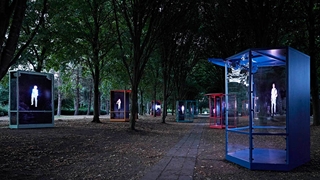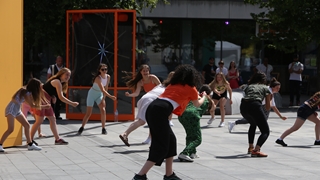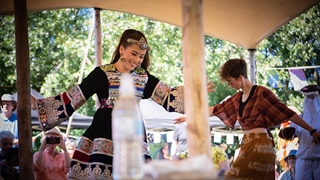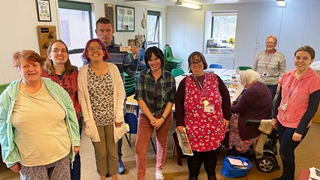
The UEFA Women’s EURO 2022 marked a pivotal shift not only in the recognition and attendance of women’s sport, but also a first for The FA who brought the worlds of sport and art together like never before for a major UK-hosted football competition. With investment from Arts Council England (thanks to National Lottery Players) matched by our 10 host city partners as well as UEFA, The FA, Greater Manchester Combined Authority, Greater London Authority, and Canals & River Trust, and the tournament was supported by an exciting £1.92m arts commissioning and Fan Party programme.
Football fans, former players and young people helped to shape the programme which centred around four women-led new commissions. Each project sort to champion female role models whilst delivering creative and cultural opportunities for host city residents.
Watch a film here showing the best of the UEFA Women’s EURO Arts and Heritage Programme .
Artist Emma Smith’s large-scale commission, The Supercompensation Cycle, was an immersive and participatory public artwork that invited participants and audiences to ‘warm-up’ for each match by replicating the movements of live performers and holographic portraits of host city residents. Emma Smith and her choreographer Lorena Randi worked with hundreds of local residents and football players across host cities to capture expert everyday moves. These were woven together to create a team of 11 holographic films embedded in specially designed sculptures to form an installation. The installation was accompanied by an immersive sound score composed by YaYa Bones and a participatory movement work, performed with local dancers, in which members of the public were welcome to join in.
The Royal Philharmonic Orchestra (RPO) worked with composer Shirley J. Thompson OBE to create an anthem to celebrate the tournament, Beautiful Game. The lyrics were inspired by three prompts set by writer Hazel Gould and fans’ perspectives collected during the project research stage. The anthem was recorded with full orchestra and 100 community representatives (10 from each host city) in Cadogan Hall.
Learn the song by downloading resources (in BSL and Makaton as well as English) and watch the film here.
Shirley J. Thompson also created a concerto for football and orchestra. Momentum challenges participants to be the soloist: bounce, juggle or tap a football in time with the rhythm along to full Royal Philharmonic Orchestra backing. Performed alone or in a group, the piece encourages fans to get creative and practice their rhythm and coordination skills, useful in both football and music.
Watch demonstration films below featuring former Lioness Fern Whelan and members of the Brighton & Hove Albion FC Girls Academy, as well as a simplified version which can be performed sitting down:
The RPO also supported seven women composers - Rosie Bergonzi, Charlotte Harding, Alice Phelps, Detta Danford, Sam Mason, and Raye Harvey, who along with teams of RPO musicians, and with the support of host city Music Education Hubs, worked with host city community members to create local anthems reflecting the spirit of each area. Twenty-four hours of workshops in each city reached more than 3,000 participants ranging in age from 0 to 92, with each area’s bespoke anthem featuring words, ideas, melodies, and rhythms created by local people. Anthems were performed live in Fan Parties by local groups and a quintet from The RPO.
They remain available online and free to use in English, BSL and Makaton. Download here.
Stadium for the Future (If I can’t dance I don’t want to be part of your revolution) by Idle Women saw women taking their rightful place along the canals and waterways in host cities through a series of women-only ‘raves’ in open air spaces including a nature reserve, a city park, a football pitch and an underpass. Organised by, and for, women’s community groups, activists, musicians, DJs, and older women, the ‘raves’ have resulted in a continuous sound work, which will be broadcast online until the stadium is built.
Through the project, Idle Women sought to honour the women who danced before ‘us’ and who worked in the mills and factories along the waterways and formed the first women’s football teams during World War I, before a ban was introduced in 1921 and lasting fifty years.
Read more and listen to the sound piece here.
Finally, artist Deborah Goatley-Birch created a resource for libraries that was activated in each host city as well as being made available nationally through a partnership with Libraries Connected – over 5,500 people took part in projects inspired by the pack. It included activities inspired by football fan objects such as rosettes, masks and banners and included a reading list of books that feature trailblazing sports people.
It has now been updated to an England Women library resource. You can use the pack at school, at home, at Girlguiding groups as well as in libraries – wherever you want to get crafty in your football celebrations. You can download the England Women Library Resource here.
Between February and July 2022, the UEFA Women’s EURO 2022 arts programme provided work for 254 artists through commissioned projects and for 221 within the Fan Parties, as well as for 51 creative practitioners. Commissioned work engaged 11,145 participants, and reached live audiences of 22,833, with an additional 106,491 people reached through digital outputs. Creative work in Fan Parties extended the reach of the project to another 15,565 participants in arts activities and to a live audience of 173,270 people.



